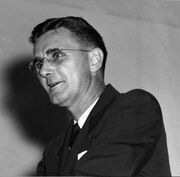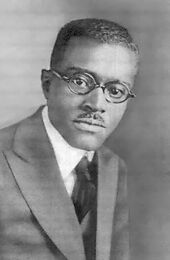
Liberal nominee Richard Mason.
The 1953 Grand Council elections took place on 14 February 1953 for the purpose of electing the Twenty-third Grand Council of the Confederation of North America. The elections were the first since 1938 to feature partisan rivalry between the incumbent People's Coalition and the opposition Liberal Party. The Liberals won 82 seats, their first majority in fifteen years.
The election took place in the wake of the Global War, which had come to a de facto conclusion four years earlier, leaving much of the world outside the C.N.A. devastated. The C.N.A. itself had remained neutral throughout the war, although Governor-General Bruce Hogg had provided considerable covert military aid to Great Britain. As word reached the C.N.A. of the massive destruction and loss of life elsewhere in the world, a pervasive sense of survivors' guilt gripped the nation. This prompted Councilman Richard Mason of the Liberals to propose in March 1949 a massive foreign aid program called the Mason Doctrine to help rebuilt the world and expiate the nation's guilt. Following passage of the Mason Doctrine, Mason spent the next three years campaigning for the leadership of the Liberal Party, which he won on the first ballot at their national convention in January 1953. In his acceptance speech, Mason pledged to make "just retribution for errors of judgment committed by previous administrations."

P.C. nominee James Billington.
The incumbent Governor-General was James Billington, who had succeeded to the office upon Hogg's death in September 1950. Billington defended Hogg's decision to remain neutral during the war, and rejected the idea that the C.N.A. bore any blame for the war's outbreak. In 1949, as Council President, Billington had successfully fought efforts by Mason and the Liberals to link Mason Doctrine aid to an explicit confession of guilt in causing the war to break out.
Unlike the Liberals, who were united behind Mason's leadership and his embrace of guilt, the People's Coalition was deeply divided. It was widely believed that Hogg had been planning to resign in the fall of 1950 in favor of his Minister of Home Affairs, Perry Jay. Hogg's death on 16 September meant that Billington automatically succeeded him under the terms of the Reform Bill of 1936. Although Jay continued to serve as Minister of Home Affairs under Billington, he fully intended to make a bid for leadership of the Coalition prior to the 1953 elections. As expected, Jay resigned from the Cabinet in the fall of 1952 and announced that he would challenge Billington at the party's January convention.
Along with their personal rivalry, there were several policy issues dividing Billington and Jay. Jay believed that Billington had been too quick to end wartime agricultural subsidies, he opposed Billington's military buildup, and he favored higher Mason Doctrine spending than Billington. All of these positions put Jay closer to Mason than Billington, and this likely cost him support at the convention, which chose Billington after a bitter fight that left the Coalition divided during the election.
Although both Billington and Mason ran forceful campaigns, the collective survivors' guilt that haunted the C.N.A. favored Mason, and he was able to lead the Liberals to an 82 seat majority in the Grand Council.
| Confederation | Liberal Party | People's Coalition |
|---|---|---|
| Indiana | 22 | 9 |
| Manitoba | 15 | 14 |
| Northern Confederation | 15 | 20 |
| Northern Vandalia | 10 | 10 |
| Southern Confederation | 11 | 9 |
| Southern Vandalia | 9 | 6 |
| TOTAL | 82 | 68 |
In a way, Billington was fortunate to have Jay and Mason as his political opponents. Billington was the first Negro to serve as governor-general of the C.N.A., and less scrupulous opponents would have sought to play upon racial prejudice to defeat him. However, both Jay and Mason were firm supporters of Negro rights, and both worked to keep racial animus among their supporters in check. Sobel quotes Councilman James Lawrey, who wrote in 1959, "Billington had many detractors in 1953, but the nation could be proud of the way he was attacked. These people hated his programs, not his skin. Even in defeat, Billington was able to prove a point. In its public life at least, the C.N.A. had become color-blind." A statistical analysis of the election by Frank Rusk showed that war guilt played a greater role in the outcome than race. Rusk wrote, "Billington lost because he seemed insensitive on the issue. Mason won because he had become identified with the acceptance of guilt."
Soon after leaving office, Billington retired from politics and was named President of North American Motors, the C.N.A.'s leading locomobile manufacturer and its largest corporation. However, the Coalition continued to be divided, which allowed Mason's new Liberal government to operate almost unopposed.
Sobel's sources for the 1953 Grand Council elections are Rusk's A Statistical Analysis of the 1953 Councilmanic Elections (New York, 1958); and Lawrey's From the Fifth: Inside the Council (New York, 1959). Election results are from the 15 February 1953 issue of the New York Herald.
| C.N.A. Grand Council Elections |
|---|
| 1843 • 1848 • 1853 • 1858 • 1863 • 1868 • 1873 • 1878 • 1883 • 1888 • 1893 • 1898 • 1903 • 1908 • 1913 • 1918 • 1923 • 1928 • 1933 • 1938 • 1943 • 1948 • 1953 • 1958 • 1963 • 1968 |
